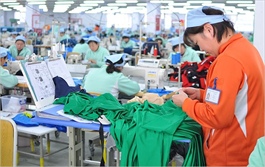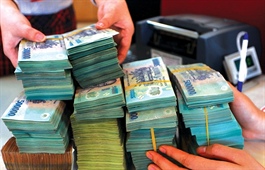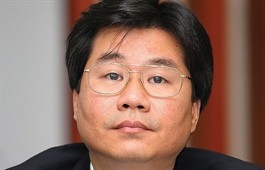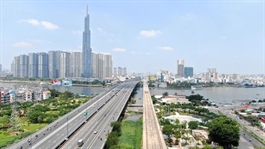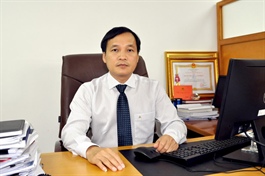Vietnam bucking the trend in foreign direct investment
Vietnam bucking the trend in foreign direct investment
Foreign direct investment has continued to serve as a key driving force for Vietnam’s socioeconomic development, sailing through difficulties in spite of the ongoing health crisis.
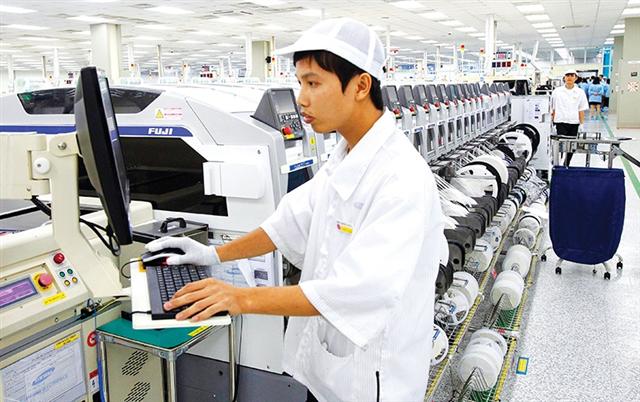
As many multinational companies are looking to diversify their supply chains, Vietnam’s FDI landscape can profit from ongoing relocation efforts, Photo Le Toan
|
After three decades of foreign direct investment (FDI) attraction, international companies have made great strides to bolster Vietnam’s economic growth while creating jobs for millions of Vietnamese workers. Many such enterprises have become successful in the country with long term investment strategies.
Japanese instant noodle maker Acecook Vietnam is one exemplary model for other investors looking for success here. The company entered the Vietnamese market in the early 1990s with aspirations to develop the society through cuisine. After 27 years of development, Acecook has become a leading instant noodle manufacturer in the market with a variety of products targeting different customer segments.
Today, Acecook Vietnam owns a system of 10 factories, four business branches, and more than 300 distributors, covering over 95 per cent of retail outlets spreading from north to south, accounting for nearly 50 per cent of the market share, and exporting to more than 46 countries worldwide.
“During the COVID-19 pandemic, Acecook Vietnam’s factories across the country are increasing the production of noodles, rice vermicelli, dried vermicelli, and glass noodles to ensure sufficient supply of goods for consumers even when the market demand increases by 30-40 per cent compared to the present,” said Kajiwara Junichi, general director of Acecook Vietnam.
“Simultaneously, we still maintain strict production standards, ensuring quality and safety of products from input materials to output products. I believe that not only Acecook Vietnam but also other businesses in the food processing industry are working every day to accompany consumers and society to overcome this difficult time.”
Meanwhile, Samsung Vietnam has been one of the key drivers of Vietnam’s export growth. Samsung Electronics is operating two smartphone factories in Bac Ninh and Thai Nguyen provinces in northern Vietnam, and produces more than 150 million handsets a year. It also runs a home appliance factory in Ho Chi Minh City.
Samsung products account for about 25 per cent of Vietnam’s exports by value. The total investment of Samsung Group in Vietnam is over $17 billion. In March, Samsung Electronics announced it started construction of its largest research and development (R&D) centre in Southeast Asia in the Tay Ho area of Hanoi.
Choi Joo Ho, president of Samsung Vietnam said, “The construction of the new R&D centre is a strategic investment and a new step forward in Samsung’s investment history in Vietnam. This will be the site that will help us fulfil our promise of developing Vietnam’s science and technology through nurturing excellent engineers in the field of high-technology.”
More foreign-directed enterprises are developing Vietnam as their key manufacturing hub. Thus, FDI increasingly makes up a large part of investment in the country.
According to statistics published by the Foreign Investment Agency (FIA) under the Ministry of Planning and Investment, in the past five years, registered FDI skyrocketed from $26.89 billion in 2016 to $38.95 billion last year. In addition, disbursed capital increased from $15.8 billion in 2016 to $17.5 billion in 2017, $19.1 billion in 2018, and $20.3 billion last year.
Minister of Planning and Investment Nguyen Chi Dung lauded the contribution of FDI in Vietnam’s socioeconomic development in each growth period, “Foreign-invested enterprises have created motivation, contributing to the economy’s turn towards industrialisation and modernisation.”
Phan Huu Thang, former director of the FIA, highlighted, “With the existing policy, especially last August’s Resolution 50-NQ/TW on orientations to perfect institutions and policies and to improve the quality and effectiveness of foreign investment cooperation until 2030, I believe that Vietnam will build a transparent investment and trading environment suitable with the international regulation and socioeconomic development conditions of Vietnam.”
The COVID-19 pandemic remains a profoundly complex global disturbance impacting Vietnam’s activities including investment, business, and foreign trade, exerting significant impacts on socioeconomic growth. During the crisis, several foreign companies have made efforts to help the community to overcome the tough times, underscoring their commitment to developing Vietnam.
Katsuhiko Usui, general director of Sapporo Vietnam, told VIR that FDI has been one of the important driving forces of Vietnam’s economic development in recent years. Among them, Japan is one of the largest investors in Vietnam with about 4,570 projects registered with $60.2 billion.
Recently, in the context of the pandemic, the Japanese government has also introduced a policy to encourage Japanese enterprises investing in foreign countries to shift investment to Southeast Asian countries. Among them, it is believed that Vietnam is one of the important destinations for Japanese investors.
“Over the past 10 years of investment in Vietnam, Sapporo has always strived to contribute to the development of the economy, as well as creating jobs and developing human resources in the areas where we operate,” Usui said. “During the pandemic this year, despite the difficult operational situation, Sapporo Vietnam still ensures the work of its employees and is trying its best to build a sustainable business operation structure.”
On the same note, Anhul Chauhan, CEO of Pizza Hut Vietnam, said that the group has not had to close any stores permanently due to the crisis, paying special attention to their 3,000+ employees in Vietnam.
“We believe that this is a people business and retaining our trained staff is going to be critical to winning with our customers. Along with a number of other operators in the segment, we have appealed to the government for help on retaining our people and employees, as is being done in other countries,” Chauhan said.
Adam Sitkoff, executive director of the American Chamber of Commerce in Vietnam, said that the health crisis has uprooted the way people work, learn, relax, and consume. Vietnam is on the road to economic recovery but in the absence of a medical solution, the strength of the recovery remains highly uncertain because Vietnam’s major trade partners have all been severely hit by the pandemic – especially the United States, which remains the largest export market for Vietnam.
“Financial pressure for many companies will continue to be significant There are, however, opportunities for Vietnam to capture new business and investment,” Sitkoff added. “The trade war from last year highlighted concerns on concentrating production in a single country and the pandemic has made those concerns clearer to everybody. I believe Vietnam will likely see even more investment as companies come under increasing pressure to diversify their supply chains.”
However, it is critical that all companies and investors encounter an equal, level, and predictable playing field as a solid foundation, not only to attract new investment but also to maintain and grow the investment that is already here.
In addition to foreign investment limitations, an overly restrictive legal framework of laws governing businesses and burdensome administrative procedures should be carefully reviewed and selectively relaxed to support economic recovery. Maybe most important, according to Sitkoff, is to enact smooth, fair, and consistent tax and auditing procedures.




